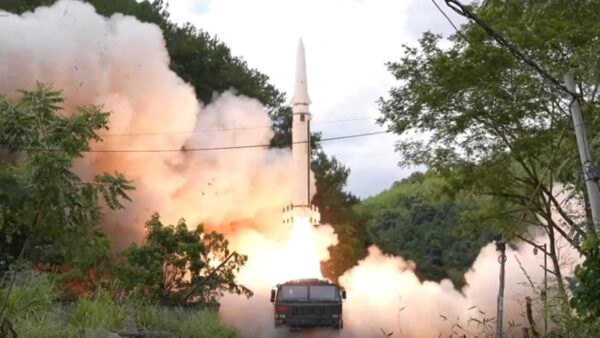The United States on Thursday condemned the launch of 11 ballistic missiles around Taiwan during the main military exercise as a reaction to Nancy Pelosi’s visit to the island, urged Beijing to reduce tension. The US Parliament speaker was the highest US official to visit Taiwan for years, opposing a series of striking threats from Beijing, who viewed the island that was governed by itself as his territory.
As a revenge, China launched a series of exercises in several zones around Taiwan, straddling several busiest shipping lines in the world and at a few points only 20 kilometers (12 miles) from the island coast. China has chosen to overreact and use speaker visits as an excuse to increase provocative military activity in and around the Taiwan Strait,” Spokesman for White House John Kirby told reporters.
“The temperature is quite high,” but tension “can go down easily by only making the Chinese stop this very aggressive military training,” he added. The exercise began around 12 noon local afternoon (0400 GMT), and involved “conventional missile shot attacks” in the waters east of Taiwan, the Chinese military said.
Taiwan said the Chinese military fired 11 Dongfeng class ballistic missiles “in several batch” and condemned the exercise as “irrational actions that damaged regional peace”. Taipei did not say where the missile landed or whether they flew on the island. But Japan, the US key ally, said that of the nine missiles that have been detected, four “are believed to have flown over the main island of Taiwan”.
Tokyo has submitted a diplomatic protest with Beijing for training, with Defense Minister Nobuo Kishi said five missiles were believed to have landed in the exclusive economic zone of his country. The Taipei Ministry of Defense said that he had detected 22 Chinese fighter jets briefly across the “median line” of the Taiwan Strait during training on Thursday.
AFP reporters on the Pingtan border island saw several small projectiles flying to the sky followed by white smoke lumps and loud booming sounds. On the mainland, in a place that is said to be the closest point of China to Taiwan, AFP saw a number of five military helicopters flying at a relatively low altitude near the popular tourist attractions. Beijing said the exercise will last until midday on Sunday. Beijing has maintained training as “necessary and fair”, blaming escalation in the United States and its allies.
“In dealing with this bright provocation, we must take legal control and necessary to protect the country’s territorial sovereignty and integrity,” Foreign Ministry Spokesman Hua Chunying said at regular direction on Thursday Military analysts told the BEIJING CCTV state announcer that the aim was to practice the possibility of the island blockade and contained its pro-independence forces.
“The aim is to show that PLA is able to control all the exit of Taiwan Island, which will be a great prevention for the ‘Taiwan Independence’ separatist forces,” said Zhang Junshe, a senior researcher at the Chinese Navy Research Institute. US Foreign Minister Antony Blinken said Washington had contacted Beijing “at every level of government” in the last few days to call for calm and stability.
“I really hope that Beijing will not produce a crisis or look for reasons for increasing his aggressive military activity,” Blinken told ministers from the 10-member Association of Southeast Asian countries (ASEAN) in Phnom Penh. Speaking at the same meeting, Japanese Foreign Minister called for ‘immediate dismissal’ for Chinese military training near Taiwan. China’s actions this time have a serious impact on regional peace and stability and international community,” Yoshimasa Hayashi told reporters.
Manouver is ongoing along several busiest shipping routes on this planet, which are used to supply vital semiconductors and electronic equipment produced at the center of the East Asian factory to the global market. The Maritime Bureau and the Port of Taiwan have issued a warning to the ship to avoid the area used for Chinese training.
The Taiwan Cabinet said the exercise would interfere with 18 international routes that passed the flight information area (FIR) 23 million Taiwan have long lived with the possibility of invasion, but the threat has increased under President Xi Jinping, the most strict Chinese ruler in one generation.
Analysts say that Chinese leadership is interested in projecting strength ahead of the important party meeting this autumn in which XI is expected to be given a third term that has never happened before, but that China does not aim to improve the situation beyond control – at least for now. Titus Chen, a professor of political science at Sun Yat-Sen University in Taiwan, said: “The last thing Xi wants is an unintentional war.”
